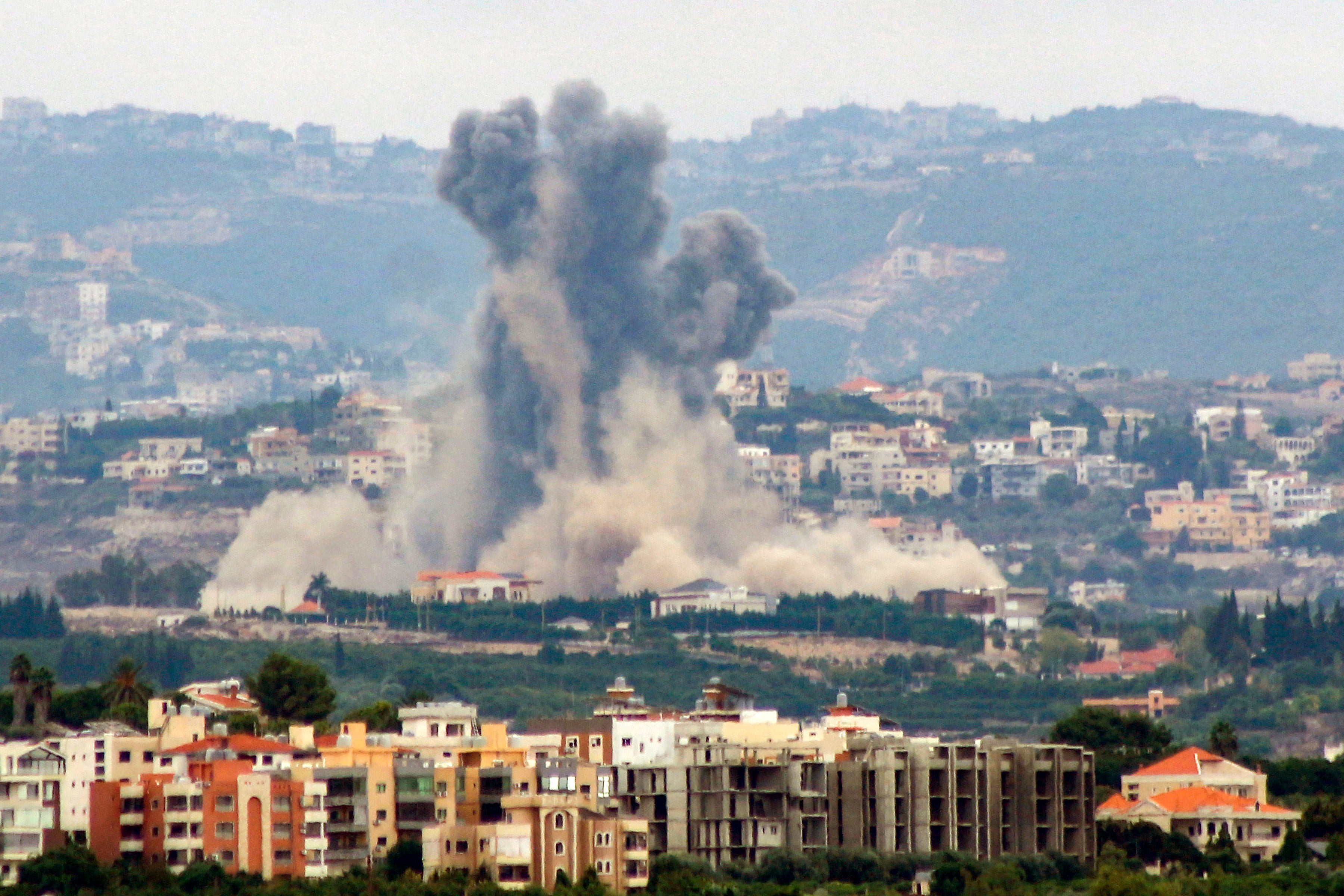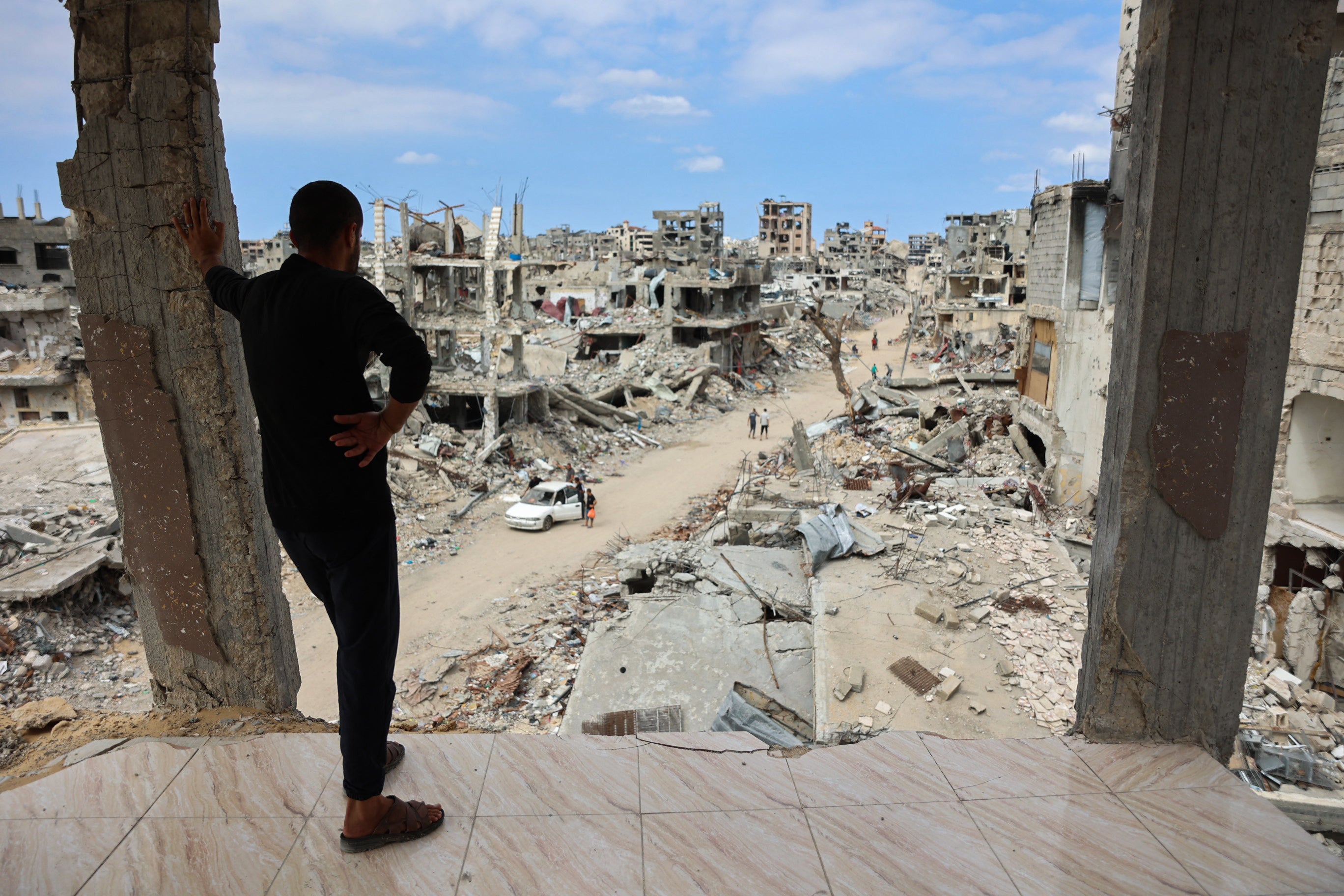Gaza hostage families blast air raid siren outside Netanyahu’s home as wake up call to agree release deal
Relatives march in Jerusalem on anniversary of Hamas attack in which their loved ones were taken to urge Israeli PM to bring them home, writes Bel Trew, while airstrikes continue in both Gaza and Lebanon


Relatives of hostages still held in Gaza marched to Benjamin Netanyahu’s home in Jerusalem at dawn, blaring an air raid siren to mark the exact time of the Hamas attack a year ago that altered so many lives forever, while warning they “won’t let [Netanyahu] rest until all of them are back”.
In the hopes of getting the Israeli prime minister’s attention, hundreds gathered outside his residence with a desperate plea for a ceasefire and hostage release deal. They sounded the haunting air raid siren for two minutes at 6.29am – the minute the act of terror by Hamas began, an attack which resulted in the killing of around 1,200 people and the kidnapping of 251. An estimated 97 remain in Gaza, with the fate of most of them unknown.
In tearful speeches on the street outside, family members begged Mr Netanyahu to honour his promise of bringing their loved ones home. The Israeli leader has faced mounting criticism for the security lapses around the attack on 7 October and for not yet securing the release of the captives.
Gil Dickmann, the cousin of hostage Carmel Gat, directly addressed Mr Netanyahu, urging him to “be the prime minister that chooses life”.
Ms Gat, 41, an occupational therapist seized from her home in Kibbutz Beeri, was believed to be next on the list to be freed in the latest proposed ceasefire deal, which faltered at the 11th hour. Ms Gat was shot dead by her captors in a tunnel a little more than a month ago.
“I still cannot believe that we will not have her back. For us, it’s too late, but it’s not too late for the other 101 hostages,” Gil told the crowds sobbing.”

Mr Dickman continued: “Mr prime minister [Benjamin Netanyahu], for a year you have said that you would do everything to bring them home – you failed in your duty.
“Please listen to the people’s hearts that call you – in a vast majority – to bring them home. It is more important than any assassination, any operation, any war. Life is more important. Be the prime minister who chooses life.”
Shir Siegel, daughter of American-Israeli hostage Keith Siegel, seized from Kfar Azar, told The Independent she couldn’t have imagined “in her worst nightmares” that he would still be in Gaza a year later.
“I’m begging everyone to do more to bring him home safe,” she said. “He has been sitting in the tunnels in Gaza, and nobody has come to save him.”

In the wake of the Hamas attack, Israel has launched one of the deadliest and most destructive military campaigns in recent history. It has killed nearly 42,000 people, according to the Palestinian health ministry, while displacing 1.9 million people out of a population of 2.3 million. The destruction has pushed areas into famine, according to the UN, and led to genocide allegations at the UN's top court in a case brought by South Africa. Israel vehemently denies the allegations.
In tandem, Israel has been locked in an escalating conflict with the Lebanese militant group Hezbollah, an ally of Hamas. Both groups are supported by Iran, who last week launched almost 200 missiles at Israel, which has vowed to retaliate. Hezbollah and Israel have traded near-daily fire across the Israeli-Lebanon border for the last year, but the conflict has intensified in the last two weeks, with Israeli airstrikes killing long-time Hezbollah leader Hassan Nasrallah and several other senior commanders. Israel has also launched a ground invasion into southern Lebanon. More than 2,000 people have been killed in Lebanon and around 1.2 million more displaced since 7 October last year – many of them in the last two weeks.
The Israeli military said the air force was carrying out extensive bombings of Hezbollah targets in south Lebanon, and that two Israeli soldiers were killed in border-area combat, taking the military death toll inside Lebanon so far to 11. It also said it carried out a strike in Beirut's southern suburbs, where a thick plume of smoke could be seen.

Lebanon's health ministry said 10 firefighters were killed in an Israeli airstrike on a municipal building in the border-area town of Bint Jbeil, and that other aerial attacks on Sunday killed 22 people in a swathe of southern and eastern towns.
The spiralling conflict has also worried the families of the Gaza hostages, who believe it has made any ceasefire exchange deal more remote.
In Gaza on Monday, Israeli tanks advanced into Jabalia, the largest of Gaza Strip's eight historic urban refugee camps, after encircling it, residents said. Soon after the rocket volley, the Israeli military expanded evacuation orders in Jabalia to cover areas in the northern towns of Beit Hanoun and Beit Lahiya. Residents said Israeli forces pounded Jabalia from the air and the ground, and medics said at least 52 people had been killed in total across Gaza.

Hamas also fired a barrage of rockets at Tel Aviv. Hezbollah has also vowed to keep up firing rockets and despite its recent losses it said it targeted a military base south of Haifa with Fadi-1 missiles and launched another strike on Tiberias, 65km (40 miles) away.
Hezbollah said it targeted areas north of Haifa in a second salvo of missiles later in the day. Israel’s military said around 135 projectiles had entered Israeli territory on Monday. Ten people were reported to be injured in the Haifa area and two others further south in central Israel.
Mr Netanyahu, who has faced mounting pressure, spoke at a small ceremony in Jerusalem on Monday, saying: “We went through a terrible massacre a year ago, and we arose as a nation of lions.”
At a special cabinet meeting in the city, the Israeli PM said: “Our counterattack on our enemies in Iran’s axis of evil is necessary for securing our future and ensuring our security.
“We are changing the security reality in our region, for our children’s sake, for our future, to ensure that what happened on 7 October does not happen again,” he added.
An official state ceremony was due to be held on Monday, but it was pre-recorded without an audience – apparently to avoid potential disruptions – in the southern city of Ofakim, which was among several communities and army bases attacked a year ago.

Anger at Mr Netanyahu’s government prompted families of those killed and taken captive to hold a separate event in Tel Aviv, which was set to draw tens of thousands of people. However, it was scaled back due to the threat of missile attacks from Iran and Lebanon.
Other events were also held across the country. Before dawn, hundreds of families of those killed at the Nova music festival joined Israeli president Isaac Herzog at the site where at least 364 partygoers were killed and many others were taken hostage.
At 6.29am – the exact minute Hamas launched its attack – the crowd observed a moment of silence. “We can’t understand how a year has passed,” said Shimon Busika, whose 25-year-old son Yarden was killed at the festival. At 6.31am, four projectiles were launched from Gaza toward the same communities that came under attack last year, without disrupting the ceremony.
Back in Jerusalem, Yulie Ben Ami, whose parents Ohad, 55, and Raz, 57, were also seized from Beeri, read the final messages she received from her father before he disappeared. Her mother, Raz, was later released in the first hostage truce deal in November. The fate of her father remains unknown.
“It’s been a year without knowing anything about you, a year without a sign of life,” she told the crowd. “Dad, I love you, and we’re fighting for you 24/7. We’re with Mom, we love you, and we’re all OK… We’re all fine and waiting for you.”
Join our commenting forum
Join thought-provoking conversations, follow other Independent readers and see their replies
Comments
Bookmark popover
Removed from bookmarks